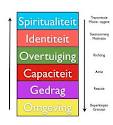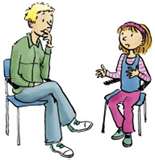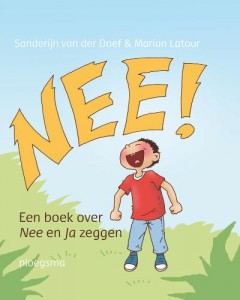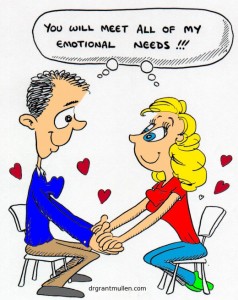Niveaus van communicatie
In communicatie onderscheid ik 8 niveaus, te weten:
-1- het beleefdheidsniveau
-2- de fatische communicatie
-3- communicatie over anderen/roddel
-4- communicatie over drama
-5- communicatie over ideeën, opinies en oordelen
-6- communicatie van gevoelens
-7- metacommunicatie
-8- spirituele/essentiële communicatie
Ad.-1- het beleefdheidsniveau:
Dat is ‘hoe gaat het met u’ zeggen uit beleefdheid in plaats van echt geïnteresseerd te zijn, de ander voelt dit meestal ook wel aan en antwoordt dan kort met ‘goed hoor’. Ook: ‘Ik zal je binnenkort bellen’ en het dan niet doen is een beleefdheidsvorm. De beleefdheid is de meest afstandelijke vorm van communicatie
Ad.-2- de fatische communicatie:
Deze communicatie gaat nergens over, het is babbelen, praten zonder wat te zeggen. Paul Simon zingt in ‘The sound of silence’: ‘People talking without speaking, people hearing without listening’. Dan is het communiceren uit angst voor de stilte. Je hebt er niks aan het is alleen bedoeld om de tijd te doden in plaats van te leven.
Ad.-3- communicatie over anderen/roddel:
Over anderen praten is een geliefd onderwerp, dan hoef je jezelf niet bloot te geven, niet te openbaren, het is veilig om over anderen te praten wat ze gedaan hebben en nagelaten hebben en fout doen, etc. Het kan gemakkelijk roddel worden, waarin we de ander in een kwaad daglicht stellen om daardoor zelf juist goed te lijken.
Ad.-4- communicatie over drama:
Drama trekt het meeste publiek. Onderzocht is dat de meeste mensen 95% van hun tijd, dus ook communicatie, besteden aan drama en slechts 5% aan essentie en ik denk dat die 5% nog aan de hoge kant is. Een vriend zei: ‘Mijn leven is een groot drama en wat geniet ik daar toch van’. De meeste mensen beperken zich tot deze eerste 4 niveaus van communicatie.
Ad. -5- communicatie over ideeën, opinies en oordelen:
Als je met je ideeën en opinies naar voren komt is er al enigszins sprake van echte communicatie, is er informatie-uitwisseling, deel je iets van jezelf, alleen hoop je vaak dat de ander met je instemt en als dat niet zo is schakel je over op een ander onderwerp of niveau om echte diepgang te vermijden. Als je de instemming van de ander nodig hebt, ben je niet zo zeker van je zaak. Met je oordeel zondig je tegen de NIVEA-regel, ofwel Niet-Invullen-Voor-Een-Ander. Je doet dat dan wel en matigt je aan dat je kunt weten hoe de ander is…
Ad. -6- communicatie van gevoelens:
Gevoelens mededelen is een nog echtere vorm van communicatie, eerlijk durven zijn over wat je voelt en dat uiten, daar is moed voor nodig. Het brengt je meer tot elkaar, je leert elkaar er beter door kennen en hopelijk ook accepteren in plaats van afwijzen. Als je je gevoelens niet wilt voelen en er niet over praat, er geen melding van maakt is de kans groot dat je ze gaat afreageren op anderen
Ad. -7- metacommunicatie:
Dit is communicatie over de communicatie, een evaluerend gesprek over hoe de communicatie bevalt en verloopt, zie m’n artikel daarover
Ad. -8- spirituele/essentiële communicatie:
Spiritueel wordt de communicatie als je volledig open bent en eerlijk en bereid bent van jezelf, je wezen te delen en openbaren en bereid bent om echt actief te luisteren. Dat je je onthoudt van oordelen en je best doet om de ander te begrijpen. Inayat Khan zei: ‘Alles begrijpen, doet alles liefhebben’. De hoogste spirituele ervaring is de onvoorwaardelijke Liefde. God is liefde.
Bij spirituele communicatie kun je schakelen tussen alle niveaus van communicatie en ben je je daarvan bewust. Je bent in staat om gewoon even een praatje te maken voor het sociale contact en de diepgang te zoeken van de essentie, je bent flexibel
Je leert pas echt over jezelf en in de mate waarin je bereid bent om over je wezen te communiceren met anderen. Ik leerde dat in gesprekken met vrienden en de gespreksgroep Attitudinal healing. Ik leerde de formule ‘share-check-share’, ofwel deel van je wezen check dan of het veilig is en er echt geluisterd wordt en deel dan meer.
Bron: Boek ‘Communicatie’ – Henny Bos (verschijnt juni 2012)





